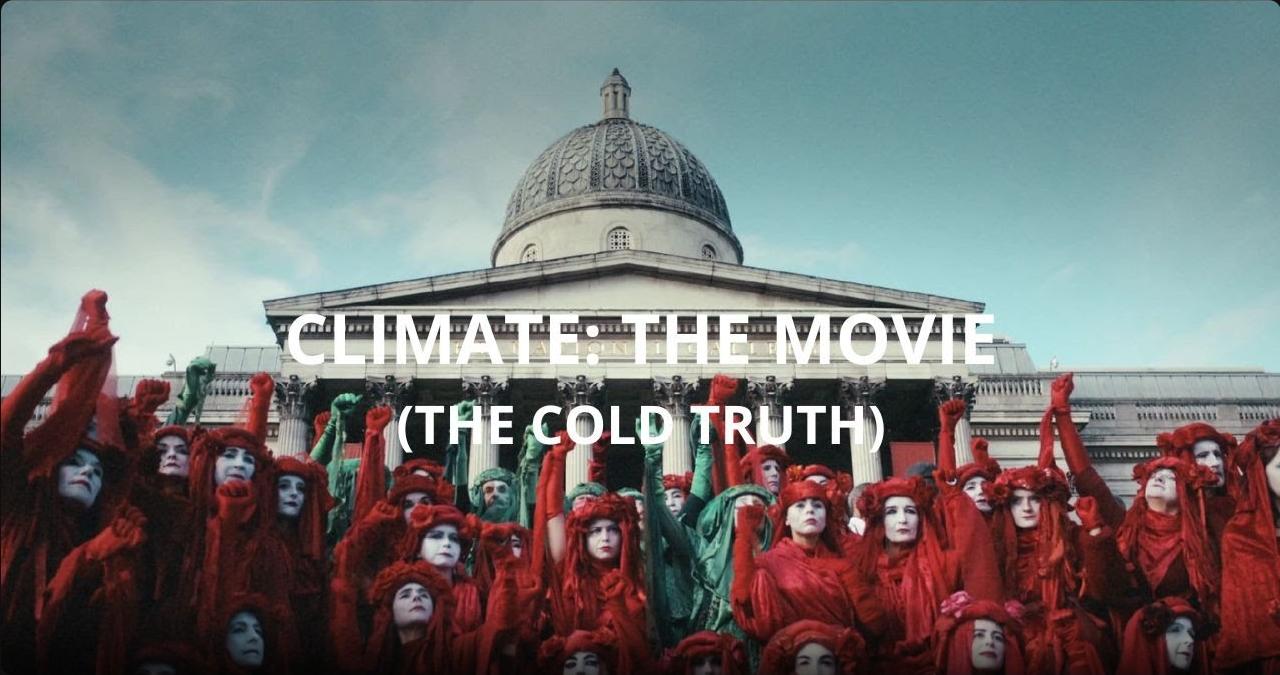Our (mankind’s) ability to control the weather and change the planet’s climate is greatly exaggerated. More precisely, it is a fruitless and wastrel endeavor and unnecessary besides.
That is the main takeaway from the new film Climate: The Movie (The Cold Hard Truth), written and directed by Martin Durkin and released last week. The film can be viewed here.
Climate will always change, no matter how many square miles of solar panels and wind turbines desecrate the landscape and oceans, regardless of how many strip-mined electric vehicles the government attempts to force-feed us, and no matter how many trillions of dollars are printed and spent by politicians and virtue-signaling multi-billionaires.
Climate change is a natural phenomenon primarily influenced by solar activity, including sunspots, solar winds, and cloud formation. That’s right: the sun impacts Earth’s climate, something I learned by drawing pictures in kindergarten science, yet is disregarded by the vast climate change mega-industry of governments, corporations, media, grant-receiving scientists and professors, and the entertainment world.
Instead, said industry is obsessed with carbon dioxide, which is a trace atmospheric gas comprising four ten-thousandths of the atmosphere, or 0.04 percent, that is essential to human, animal, and plant life. Indeed, CO2 makes the world livable and thriving, yet is falsely labeled a “pollutant” that somehow threatens the existence of Earth itself and must be curtailed. In fact, carbon in the atmosphere has been much higher at temperatures cooler and hotter than today, at levels resulting from temperature changes, rather than the cause of them.
Climate: The Movie features a series of interviews of prominent and credentialed scientists, including Steven Koonin, NYU professor and former Assistant Secretary of Energy in the Obama administration; Richard Lindzen, retired atmospheric physicist from Harvard University and the Massachusetts Institute of Technology; Roy Spencer, meteorologist at the University of Huntsville in Alabama and an award-winning veteran of NASA; Willie Soon, an astrophysicist and aerospace engineer at Harvard and the Smithsonian; and others, some of whom were blackballed for daring to challenge the prevailing climate change group-think narrative.
Another major feature of the film is data. How warm is the planet today compared to previous decades, centuries, and millions of years ago? Based on rock formations, temperature can be estimated going back as long as 500 million years. At the present day, it turns out Earth is in a colder period than the planetary norm. Measured over thousands of years, the climate has been quite stable, ranging within a few degrees, and now in an overall warming trend by about one degree since the late 1800s, during which average global temperature has varied modestly up and down.
Another key data point is the amount of carbon dioxide in the atmosphere, which was four and five times higher than the levels of today, at 2,000-plus parts per million, including during ice ages. Yet, such realities have eluded climate obsessives like John Kerry and countless others who assert that nameless scientists warn of exceeding 400 parts per million means the planet is headed to a proverbial danger zone.
In sum, the climate changes of recent decades and centuries have ebbed and flowed in an unremarkable, non-threatening fashion.
The film also discusses the importance of accurately measuring global temperature change by making apples-to-apples comparisons, which the climate alarmist industry routinely ignores to fulfill its political narrative. Temperature records of 100 or more years past were commonly taken from thermometers in sparse areas when the U.S. was a more rural nation. These readings do not properly compare to results taken in dense areas of today due to the “urban heat effect,” studied by Dr. Spencer. By contrast, temperature data measured by satellites, ocean or rural-based thermometers show smaller vicissitudes over time.
How did it get this way? How did climate change alarmists become a pervasive influence? Money. It always comes back to the money, primarily from government.
After a global cooling period in the 1970s, when actor Leonard Nimoy (“Mr. Spock”) and many others warned of the coming ice age (even as man-made carbon emissions were sharply increasing since World War II), temperature reverted slightly upward. This spawned a movement championed by then- U.S. Senator Al Gore, who became Vice President in the Clinton administration, which sharply increased funding to study global warming.
Government research funding typically chases problems to “study” and solve, the film asserts. The climate change issue, with its growing alarm bells, unscrupulously parroted in the media for decades, has since gone far beyond government research grants to subsidizing big corporate industries (e.g., solar, wind, EVs) to purportedly lower the temperature.
Politicians from President Biden on down who peddle climate exaggerations, dutifully echoed by most national media, will go on ignoring the science and reality presented in Climate: The Movie. To otherwise embrace the scientific evidence from this robust film would mean the end of the climate gravy train and the climate alarmist crusade to expand government power and control over society.
